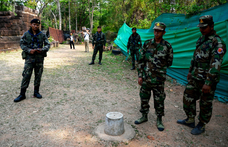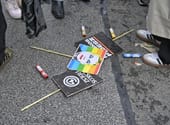The NBH worried more about Bacsfi than about kuruc.info
For three years, the National Security Office's (NBH) official yearbooks said not a single word about far right groups, even though there was a time when both far right and anti-democratic left-wing groups had their place in the NBH's publications.
Get a few people together, put up a few pictures of Ferenc Szalasi, executed leader of the wartime Arrow Cross fascist party, on the Nagykorut and then pose for the press photographers. That's all you need to do dominate the NBH's annual report on extremist groups and organisations. At least that's the way it was in 2004, when the NBH's yearbook was full of Diana Bacsfi and her Hungarist organisation, the Hungarian Future Group, which had barely 60 members.
But more recent annual reports have nothing to say about kuruc.info, a far-right news portal which uses far more radical tricks than anything Diana Bacsfi imagined during her few months of notoriety. The most recent report deals with 2007, when the portal was very active and extremely well known.
It's particularly interesting given that the NBH once devoted time to hunting out extremist writings on the internet, regardless of whether that material was on local or foreign servers. The 2002 yearbook showed that the NBH had shut down extremist websites on several occasions. In one case, for example, the security service identified a person who had placed hate-filled song lyrics on an American server. The NBH passed the matter on to prosecutors.
© Végel Dániel |
The report for 2000 is an exception. There is nothing on left- or right-wing extremists, but nor is thre anything on counter-intelligence, terrorism or organised crime. The report deals almost exclusively with the NBH's internal organisation.
The 2001 yearbook dealt most intensively with the far right, which had become more visible in 2000 as part of the anti-globalisation movement. The 2003 report is the most recent to mention left extremists. That year's report dealt with demonstrations against the Iraq war in Budapest and Greenpeace's demonstrations against the Paks nuclear power station.
Intellectuals and public activists responded with an open letter to Andras Toth, then the state secretary responsible for the NBH, complaining that the report labelled the Hungarian anti-war movement and the environmentalist movement alike as "extreme left-wing".
Signatories were angry that the secret services regarded as dangerous "extremist movements" organisations that "respect the Republic's constitutional order."
These groups' protests were so successful that in the 2007 report, the NBH said nothing at all about far left groups. From then on, the chapters on extremist groups dealt only with the far right and religious groups it regarded as dangerous.
CS. B. - A. D.















